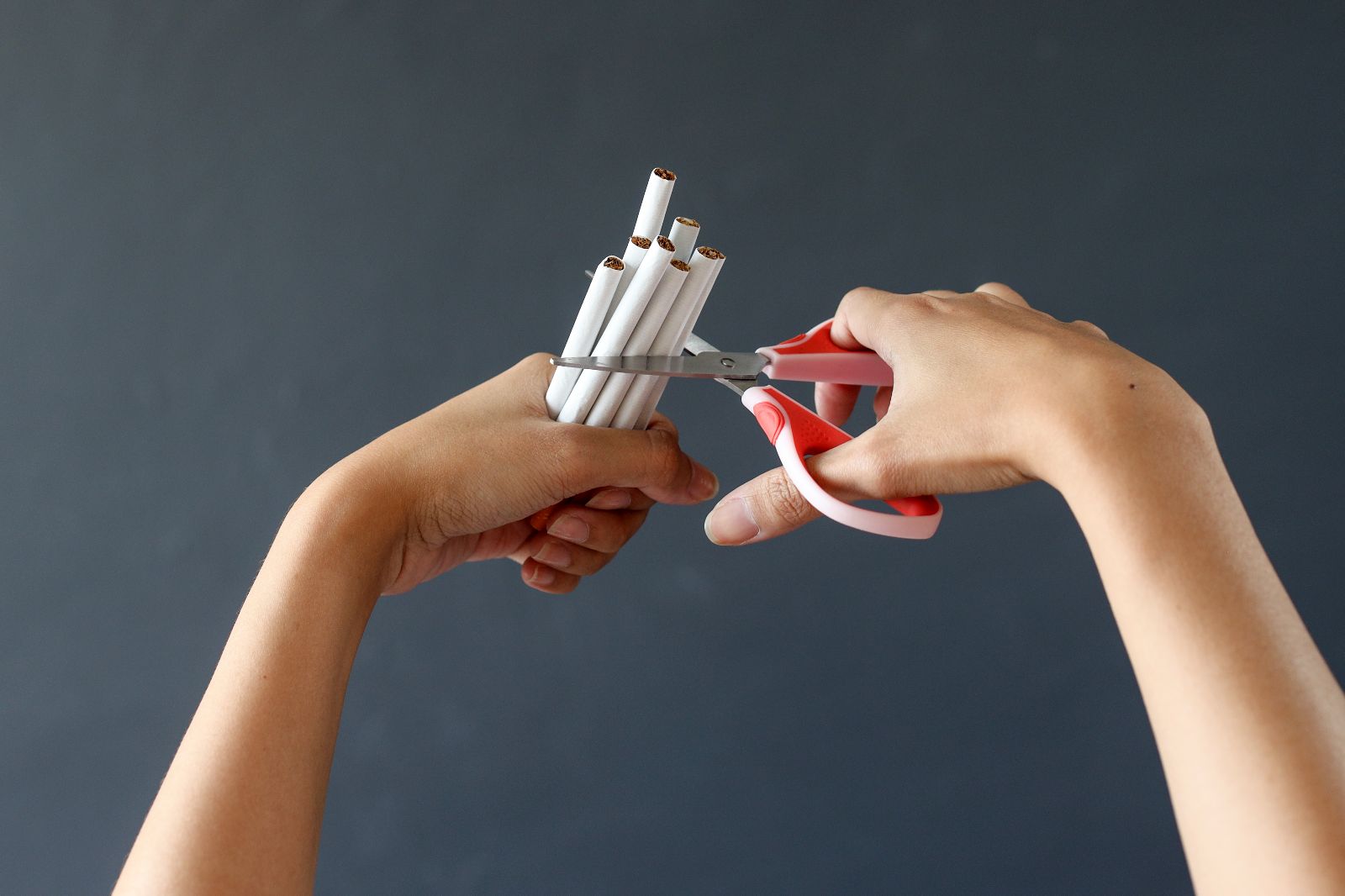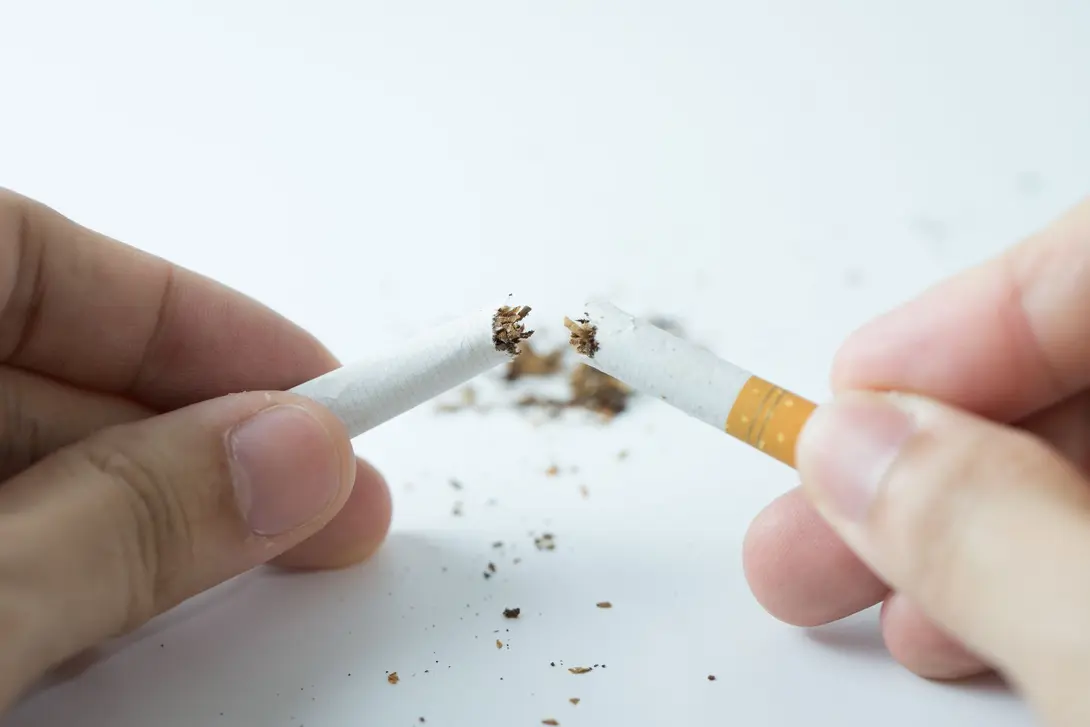Quitting smoking is one of the most important steps you can take to improve your health and quality of life, and it is a decision that can fill us with pride. Smoking is linked to numerous serious diseases, including cancer, heart disease and respiratory problems.
However, many smokers fear that quitting will lead to weight gain, which can be a legitimate concern. This fear is understandable, since the process of quitting smoking can trigger changes in the body and eating habits. Fortunately, there are effective strategies to quit smoking without gaining weight.
Today we want to show you why we become addicted to cigarettes, what effects nicotine has on our body, and how we can stop smoking while maintaining a healthy weight. With the right information and tools, you can overcome this addiction and adopt a healthier lifestyle without having to worry about weight gain.
Shall we start?
Why do we become addicted to cigarettes?
Cigarette addiction is mainly due to nicotine, a highly addictive chemical found in tobacco. Nicotine affects the brain and creates a temporary feeling of pleasure and well-being. This sensation is what makes us want to smoke repeatedly, developing a physical and psychological dependence.

What does nicotine do to us?
Nicotine acts on nicotinic receptors in the brain, releasing dopamine, a neurotransmitter associated with feelings of pleasure and reward. This release of dopamine is what makes smoking so addictive. Additionally, nicotine can increase concentration and reduce stress, further reinforcing smoking.
Nicotine also has effects on other parts of the body. It increases heart rate and blood pressure, which can lead to increased oxygen demand by the heart. In the long term, these effects can contribute to the development of cardiovascular diseases. In addition, nicotine can affect the gastrointestinal system, causing a decrease in appetite and an alteration in intestinal motility.
When smoking regularly, the body adapts to the continuous presence of nicotine. This means that when you try to quit smoking, you experience withdrawal symptoms that can include irritability, anxiety, difficulty concentrating, and a strong desire to smoke. These symptoms can make the process of quitting particularly challenging, but it is important to remember that they are temporary and that there are strategies available to manage them.

What happens when we stop smoking?
12 hours after quitting smoking
At this point, the nicotine has completely disappeared from your blood, and carbon monoxide levels have returned to normal. However, this is also when withdrawal symptoms become more intense. You will likely experience a bad mood, headache, and nausea as your body begins to adjust to the absence of nicotine.
3 days later
After three days, your blood pressure and heart rate begin to stabilize. Despite these improvements, withdrawal symptoms are still present, and you may find it difficult to concentrate on even simple tasks. This lack of concentration is a sign that your brain is adapting to functioning without nicotine.
2 weeks later
Within two weeks, you will notice that coughing and episodes of shortness of breath during acute physical exertion begin to disappear. Anxiety, although still present, gradually reduces. This period marks the beginning of a more noticeable recovery in your respiratory health and general well-being.
8 weeks later
At eight weeks, the cilia, small structures that line your bronchi and help filter germs and particles, have recovered significantly. This reduces the frequency of respiratory infections and improves your lung capacity. In addition, the psychological dependence on cigarettes decreases considerably, facilitating the continuity of your process of quitting smoking.
6 months later
Six months after quitting smoking, the most difficult moments are behind us. Psychological dependence practically disappears, and both blood circulation and respiratory function have noticeably improved. This recovery is a testament to the regenerative power of the human body when harmful factors such as tobacco are eliminated.
5 years later
After five years, the risk of coronary heart disease is reduced by half compared to smokers. Furthermore, the improvement in your breathing capacity is significant, comparable to that of a person who has never smoked. This period highlights the importance of persistence in quitting tobacco to achieve long-term health benefits.
6 years later
Six years after quitting smoking, the risk of developing cancer of the mouth, throat, esophagus and bladder has decreased by 50%. This reduction in cancer risk underscores the importance of staying tobacco-free to prevent serious and life-threatening diseases.
10 years later
A decade after quitting smoking, your risk of developing lung cancer has been cut in half compared to when you were a smoker. In addition, the risk of pancreatic and laryngeal cancer is also significantly decreased. These benefits highlight the lasting positive impact of quitting smoking.
15 years later
Fifteen years after quitting smoking, your health resembles that of someone who has never smoked. The risk of heart disease is equal to that of non-smokers, showing that the body can fully recover from the damage caused by smoking with time and perseverance.
Why do people who stop smoking gain weight?
One of the common side effects of quitting smoking is weight gain. This may be due to several reasons:
- Increased appetite: Nicotine suppresses appetite, and when you stop smoking, your appetite can increase.
- Change in metabolism: Nicotine increases the speed of metabolism. When you quit smoking, your metabolism may slow down, which can lead to weight gain.
- Oral substitution: Many ex-smokers substitute the act of smoking with eating, especially unhealthy, high-calorie foods.
- Changes in sugar levels: Smoking affects blood sugar levels. Quitting smoking may cause cravings for sweet foods to compensate for these changes.
Why is it worth quitting cigarettes?
Despite the fear of weight gain, quitting smoking has countless health benefits. These include:
- Better lung health: Reduce the risk of lung diseases such as emphysema and chronic bronchitis.
- Lower risk of cancer: Reduce the risk of several types of cancer, including lung, throat and mouth.
- Better cardiovascular health: Reduce the risk of heart disease and stroke.
- Improvement in the sense of taste and smell: Recover these senses that are affected by smoking.
- Increased energy: Feeling more active and energized.
- Saving money: Spend less money on cigarettes.
How to quit smoking without gaining weight?
Abandon it progressively
Quitting smoking gradually can help minimize withdrawal symptoms and maintain control over your weight. Reduce the number of cigarettes you smoke each day until you can quit completely.
Create new habits
Replacing smoking with healthy activities can help you avoid weight gain. For example, instead of smoking, you can take a walk, read a book, or pursue a hobby.
Carrying out self-registrations
Keeping track of your progress can be a powerful tool. Write down every time you feel like smoking and how you feel. This will help you identify patterns and find effective strategies to manage cravings.
Increase exercise
Not only will exercise help you avoid weight gain, it can also reduce nicotine cravings and improve your mood. Try incorporating a variety of exercises such as walking, running, swimming or yoga.

Satisfy the need for sugar with healthy products
It is common to have sugar cravings when quitting smoking. Opt for healthy options like fresh fruits, plain yogurt, and nuts instead of sweets and treats.
Bread and rice, with fiber
Choose whole grain breads and rice instead of their refined versions. Foods rich in fiber will help you feel fuller longer and maintain stable blood sugar levels.
Fruit
Fruits are an excellent option to satisfy your sugar cravings in a healthy way. They are low in calories and rich in essential nutrients.
Drink much liquid
Staying hydrated is crucial when you quit smoking. Drinking water can help you reduce food cravings and eliminate toxins from your body.
Take skimmed dairy products
Skim dairy is a good source of protein and calcium without the extra calories of full-fat versions. They can help you feel satisfied and maintain a healthy weight.
quality proteins
Incorporate lean proteins such as chicken, fish, tofu and legumes into your diet. Protein helps you feel full and maintain muscle mass while you lose fat.
Eliminate coffee and tea
Coffee and tea can be triggers for some people who quit smoking. If this is your case, consider reducing your consumption or eliminating them temporarily.
Foods to add to our diet
- Dark Chocolate: Dark chocolate is an excellent option to satisfy sweet cravings. It is rich in antioxidants and can be enjoyed in moderation.
- Banana: Banana is a fruit rich in potassium that can help reduce cravings and maintain energy.
- Pistachios: Pistachios are a healthy, protein-packed snack that can help keep you satisfied between meals.
- Legumes: Legumes such as lentils and chickpeas are rich in protein and fiber, making them an excellent choice for main meals.
- Plums and pineapple: Plums and pineapple are delicious fruits that can help you satisfy sweet cravings in a healthy way.
- Whole oats: Whole oats are an excellent option for breakfast. It is rich in fiber and can help keep you full and energized throughout the morning.
- Salmon and sardine: Salmon and sardine are rich in omega-3 fatty acids, which are beneficial for heart health and can help reduce inflammation.

Carry out the process with someone else
Quitting smoking can be easier if you do it with someone who is going through the same situation. Supporting each other and sharing experiences can make the process less lonely and more motivating.

Quitting smoking is challenging, but the health benefits far outweigh the initial difficulties. With careful planning and the right strategies, you can quit smoking without gaining weight. Remember that everyone is different, so it's important to find the tactics that work best for you. Good luck on your journey to a smoke-free and healthier life!




Comentarios